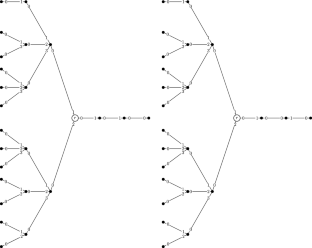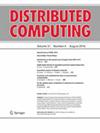Four shades of deterministic leader election in anonymous networks
IF 2.1
4区 计算机科学
Q3 COMPUTER SCIENCE, THEORY & METHODS
引用次数: 1
Abstract
Leader election is one of the fundamental problems in distributed computing: a single node, called the leader, must be specified. This task can be formulated either in a weak way, where one node outputs leader and all other nodes output non-leader, or in a strong way, where all nodes must also learn which node is the leader. If the nodes of the network have distinct identifiers, then such an agreement means that all nodes have to output the identifier of the elected leader. For anonymous networks, the strong version of leader election requires that all nodes must be able to find a path to the leader, as this is the only way to identify it. In this paper, we study variants of deterministic leader election in arbitrary anonymous networks. Leader election is impossible in some anonymous networks, regardless of the allocated amount of time, even if nodes know the entire map of the network. This is due to possible symmetries in the network. However, even in networks in which it is possible to elect a leader knowing the map, the task may be still impossible without any initial knowledge, regardless of the allocated time. On the other hand, for any network in which leader election (weak or strong) is possible knowing the map, there is a minimum time, called the election index, in which this can be done. We consider four formulations of leader election discussed in the literature in the context of anonymous networks: one is the weak formulation, and the three others specify three different ways of finding the path to the leader in the strong formulation. Our aim is to compare the amount of initial information needed to accomplish each of these “four shades” of leader election in minimum time. Following the framework of algorithms with advice, this information (a single binary string) is provided to all nodes at the start by an oracle knowing the entire network. The length of this string is called the size of advice. We show that the size of advice required to accomplish leader election in the weak formulation in minimum time is exponentially smaller than that needed for any of the strong formulations. Thus, if the required amount of advice is used as a measure of the difficulty of the task, the weakest version of leader election in minimum time is drastically easier than any version of the strong formulation in minimum time.

匿名网络中确定性领导人选举的四种阴影
Leader选举是分布式计算的基本问题之一:必须指定一个称为Leader的节点。这个任务可以用弱的方式来表述,其中一个节点输出领导者,所有其他节点输出非领导者,或者用强的方式来表述,其中所有节点也必须知道哪个节点是领导者。如果网络的节点具有不同的标识符,那么这样的协议意味着所有节点都必须输出选出的领导者的标识符。对于匿名网络,强版本的领导者选举要求所有节点必须能够找到通往领导者的路径,因为这是识别领导者的唯一方法。本文研究了任意匿名网络中确定性领导者选举的变体。在某些匿名网络中,无论分配多少时间,即使节点知道网络的整个地图,也不可能进行Leader选举。这是由于网络中可能存在的对称性。然而,即使在网络中有可能选出一个知道地图的领导者,在没有任何初始知识的情况下,无论分配的时间如何,任务仍然是不可能完成的。另一方面,对于任何知道地图可以选举领导人(弱或强)的网络,存在一个最小时间,称为选举指数,在这个时间内可以完成选举。我们考虑了匿名网络背景下文献中讨论的领导者选举的四种表述:一种是弱表述,另外三种是在强表述中找到领导者路径的三种不同方式。我们的目的是比较在最短时间内完成这“四种色调”的领导人选举所需的初始信息量。遵循带建议的算法框架,该信息(单个二进制字符串)由了解整个网络的oracle在开始时提供给所有节点。这个字符串的长度称为advice的大小。我们表明,在最短时间内完成弱公式中领导人选举所需的建议大小比任何强公式所需的建议大小都要小得多。因此,如果将建议的数量作为任务难度的衡量标准,那么在最短时间内选出领导人的最弱版本要比在最短时间内选出强版本容易得多。
本文章由计算机程序翻译,如有差异,请以英文原文为准。
求助全文
约1分钟内获得全文
求助全文
来源期刊

Distributed Computing
工程技术-计算机:理论方法
CiteScore
3.20
自引率
0.00%
发文量
24
审稿时长
>12 weeks
期刊介绍:
The international journal Distributed Computing provides a forum for original and significant contributions to the theory, design, specification and implementation of distributed systems.
Topics covered by the journal include but are not limited to:
design and analysis of distributed algorithms;
multiprocessor and multi-core architectures and algorithms;
synchronization protocols and concurrent programming;
distributed operating systems and middleware;
fault-tolerance, reliability and availability;
architectures and protocols for communication networks and peer-to-peer systems;
security in distributed computing, cryptographic protocols;
mobile, sensor, and ad hoc networks;
internet applications;
concurrency theory;
specification, semantics, verification, and testing of distributed systems.
In general, only original papers will be considered. By virtue of submitting a manuscript to the journal, the authors attest that it has not been published or submitted simultaneously for publication elsewhere. However, papers previously presented in conference proceedings may be submitted in enhanced form. If a paper has appeared previously, in any form, the authors must clearly indicate this and provide an account of the differences between the previously appeared form and the submission.
 求助内容:
求助内容: 应助结果提醒方式:
应助结果提醒方式:


